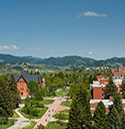Community Health Major
The undergraduate program in Community Health is focused on improving health and well-being for all through the promotion of healthful lifestyles healthy family functioning, community actions for health, and conditions that make it possible to live healthful lives. The program draws on public health, education, psychology, sociology, family science, and other social and behavioral sciences.
The Community Health program stresses community involvement because community health emphasizes an interactive process. The undergraduate program culminates in an internship experience that is research and/or service focused. Throughout the program and in the internship, students will learn to assess individual and community needs; plan, implement, and evaluate effective health programs; coordinate provision of services; act as a resource person; and communicate health needs, concerns and resources.
Graduates of the Community Health program are prepared to work in a variety of settings including family planning agencies, nonprofit agencies, state and federal health agencies, schools, and community health centers. Our students are employed in entry-level positions focused on planning, administration, evaluation, research, and teaching in community health settings. Students are well prepared for and highly encouraged to pursue a graduate degree in public health or other related area upon completion of the undergraduate program.
Completion of the Community Health undergraduate degree establishes eligibility to sit for the Certified Health Education Specialist (CHES) examination. The CHES exam measures the possession, application, and interpretation of knowledge essential to the practice of community health/health education. The CHES certification is a national standard for health education practice and assists employers in identifying qualified health education practitioners.
Students must receive a grade of "C" or higher in all required courses.
Completion of the community health major establishes eligibility to sit for the Certified
Health Education Specialist (CHES) examination. The CHES exam measures the possession,
application, and interpretation of knowledge essential to the practice of community
health/health education. The CHES certification is a national standard for health
education practice and assists employers in identifying qualified health education
practitioners.
Interested students may also complete additional courses and apply for provisional
certification for the Certified Family Life Educator (CFLE) program accredited by
the National Council on Family Relations.
- Health Educator: Yellowstone City-County Health Department, Billings, MT
- Community health educator: State of Montana Department of Public Health and Human Services, Helena, MT
- Health Programs Outreach Specialist: Vermont Department of Health
- Health Promotion Specialist/Community Health Educator: The Summit Health Promotion and Fitness, Kalispell, MT
- Resource Coordinator: Supported LIving in Great Falls, Shelby and Conrad Quality Life Concepts, Great Falls, MT
- Case Manager: Women Reaching for Wellness Program in cooperation with the Montana Department of Public Health and Human Services Breast and Cervical Health Program
- Familial Dilated Cardiomyopathy (FDC) Research Project Coordinator: Oregon Health and Science University, Division of Cardiology, Portland, OR
- Environmental Risk Reduction through Nursing Interventions and Education (ERRNIE) Project Coordinator: Montana State University, College of Nursing, Bozeman, MT
- Peace Corps volunteer: Mongolia and Ecuador
- Warehouse Manager/Volunteer Coordinator: Gallatin County Food Bank
- Educational Talent Search Coordinator (youth mentoring): Great Falls, MT
- Americorps Team Leader: Office for Community Involvement, Montana State University, Bozeman, MT
- Health Educator: Community Health Associates
- Executive Director: Summer Wind Assisted Living Facility, Boise, ID
- Work Services Specialist: Reach, Inc., Bozeman, MT
- Group Home Instructor: Reach, Inc., Bozeman, MT
- Health Physicist: United States Army
- Clinical Assistant: Planned Parenthood, Eugene, OR
- Child and Adolescent Case Manager: Northeastern Center, Auburn, IN
- Blue Mountain Women's Clinic: MIssoula
- Environmental Health Specialist/Sanitarian: Boise Central District Health Department
- Health Educator: American Red Cross, Washington, DC
- Kinship Care Specialist/Social Worker: Children's Home Society, South Dakota
- Youth Mentoring Coordinator: AWARE Early Head Start, Butte, MT
- Education Manager : Central Maine Medical Center
- Health Educator: Health Maintenance Organization, California
- Employee Wellness: MSU-Northern, Havre, MT
- Health administration and management
- Health education
- Public health
- Nursing school
- Chiropractic school
- Nutrition
- Occupational therapy
- Physician's assistant school
- Physical therapy school
- Epidemiology
Completion of the community health option establishes eligibility to sit for the Certified Health Education Specialist (CHES) examination.
What is a CHES? Health educators are professionals who design, conduct and evaluate activities that help improve the health of all people. These activities can take place in a variety of settings that include schools, communities, health care facilities, businesses, colleges and government agencies.
Health educators are employed under a range of job titles such as patient educators, health education teachers, trainers, community organizers and health program managers. Certified Health Education Specialists (CHES) are those who have met the standards of competence established by NCHEC and have successfully passed the CHES examination.
The CHES designation after a health educator's name is an indication of professional competency and commitment to continued professional development (from the NCHEC website).
Faculty













